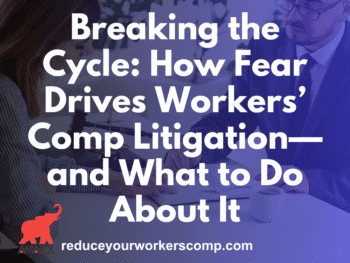From the November 6, 2009 Fraud Blotter
Defendants are presumed innocent until proven guilty.
The North Carolina Industrial Commission, its deputy commissioners and appellate courts have taken the unusual step of directing Mission Hospital to pay employees’ attorney fees as a penalty for the way in which it handled at least six disputes over injuries to its workers this decade. The hospital failed to turn over key evidence in workers’ compensation cases, gave employees blatantly incorrect information about the law and repeatedly denied benefits without basis, state officials found.
Click Link to Access Free PDF Download
“Avoid the 3 Primary Reasons Injured Workers’ Hire Attorneys”
A local attorney representing employers in workers’ compensation cases, said it is possible that Mission “has been sanctioned more than any other employer in the state in the past five years.”
“This is not usual (for employers) and there’s no reason that it ought to be going on,” she said, adding the cases reflect “a long-term situation that needs cleaning up.”
Mission’s conduct came to light following a September 22, 2009 ruling by Deputy Commissioner George Glenn II in which Glenn referred Mission’s handling of a case to the state Department of Insurance and the state attorney general’s office. He ordered Mission to pay the attorney fees of a former employee “Mrs. Swanson”, as well as an additional penalty of 10% of the benefits due her because of Mission’s “bad faith denial and fraudulent actions.”
A spokeswoman for Attorney General Roy Cooper said attorneys at the Department of Justice and Department of Insurance have been discussing how to handle what she called “an unusual case.”
Mission said earlier this week that it had not been contacted by either agency. It is appealing Glenn’s decision in the “Swanson” case.
In a written response to questions from the Citizen-Times, Mission did not directly contradict allegations that it has deliberately sought to deny valid claims. It has said it welcomes any investigation by the state.
Repeated Problems
State workers’ compensation laws provide that employees are entitled to costs of their medical treatment and two-thirds of their lost wages while out of work because of job-related injuries. Workers cannot collect damages for pain and suffering or punitive damages, but the system is supposed to resolve their cases quickly in return.
Cases in which employees challenge their employers’ denial of workers’ compensation benefits generally go first to informal mediation under the direction of the Industrial Commission, a state agency. Either party can then seek a hearing before one of the commission’s deputy commissioners, whose status is comparable to that of an administrative law judge. Appeals from those rulings are heard by panels made up of three members of the Industrial Commission. From there, either party can appeal to the state Court of Appeals. Cases occasionally go on from there to the state Supreme Court.
A review of decisions in disputed cases suggests that Mission does not always play by the rules when handling cases in which it and the injured employee do not agree. For example:
1. In the “Swanson” case, Glenn found that a Mission employee knowingly made a false statement to “Swanson” as part of an effort to mislead her and deny her benefits. He also wrote that Mission’s decision to deny “Swanson” continued benefits came “in spite of the overwhelming evidence to the contrary.”
2. In a different case, a deputy commissioner found that a Mission official would not authorize payment for medicines prescribed by a physician to combat depression despite knowing the injured employee was entering the psychiatric ward.
3. In a 2002 ruling in another case, a deputy commissioner found that Mission ignored the “unequivocal” findings of its own expert when it denied continued benefits to a medical records clerk who was injured by mechanized shelving that closed on her in a records room. The clerk said she thought she would be killed by the shelves. Mission’s contention that the experience did not cause subsequent psychological problems was based on “no competent medical evidence,” the ruling says.
4. The commission found in 2005 that Mission had withheld videotaped evidence that showed an employee crying after unsuccessfully attempting to return to work.
How Unusual?
Mission, which has about 6,000 employees, said in its statement that employees filed 4,406 “occurrence” reports of incidents in which injuries could have occurred between April 2005 and October 15, 2009.
The statement says that among those incidents, it found 1,094 instances when an employee was injured on the job and that “only 26 claims or 2.3% were determined not to be compensable” under workers’ compensation rules.
Mission said it has become more common for a deputy commissioner or the Industrial Commissioner to award attorney fees to the losing party in general and that “the awarding of attorney fees does not necessarily suggest an employer has acted in bad faith.” A local attorney who has won attorney fees from Mission, said the fees are assessed “not when someone has fought a case but (when) they’ve fought them unfairly.” The attorney is also chairman of the Buncombe County Board of Commissioners.
State law says attorney fees can be assessed if there is a finding that a case “has been brought, prosecuted, or defended without reasonable ground.”
Mission pointed out that officials have sometimes disagreed over whether fees were warranted in its cases. It says that overall it has won eight cases before the commission since 1995 and lost eight.
The Industrial Commission does not keep statistics on how often attorney fees are awarded. Some attorneys who practice workers’ compensation law in the state said losing parties do have to pay attorney fees more often than in the past, but that it is still rare. (workersxzcompxzkit)
Attorneys representing plaintiffs in workers’ compensation cases agree assessing fees is very unusual and a rare occurrence, saying these sanctions very serious. There is also concern there may be many unknown cases because Mission told injured employs they could not file a workers’ comp claim.
The statistics also do not explain the hospital’s conduct in cases in which it was sanctioned as the hospital, failed to improve their claims handling process.
Mission Hospital Comments
In an October 2009 statement Mission Hospital said: Mission “has been subject to sanctions by three other Deputy Commissioners, based upon unfounded litigiousness. . . . (Its) prior behavior shows (a) pattern and practice of unreasonable defense of these claims and poor responses and conduct regarding injured employees.” – Kim Ledford, deputy commissioner, N.C. Industrial Commission, July 2004
Mission “has a long and well established history in workers’ compensation claims before the Industrial Commission and Court of Appeals wherein they have been found to have unreasonably denied workers compensation cases and sanctioned with attorney fees, and their actions in denying this claim (are) consistent with such practices.”
– George Glenn II, deputy commissioner, N.C. Industrial Commission, September 2009
“We continually evaluate our process and handling of workers’ compensation, and have periodic reviews by outside consultants.”
Reposted with Permission: Visit LexisNexis Workers’ Comp Law Practice Center for more information and full reports.
TRY OUR FREE TOOLS:
WC Calculator: www.reduceyourworkerscomp.com/calculator.php
WC 101: www.ReduceYourWorkersComp.com/workers_comp.php
Follow Us On Twitter: www.twitter.com/WorkersCompKit
View the Entire Blog: https://blog.reduceyourworkerscomp.com/
http://reduceyourworkerscomp.com/Return-to-Work-Programs-Unionized-Companies.php
Do not use this information without independent verification. All state laws vary. You should consult with your insurance broker or agent about workers’ comp issues.
©2009 Amaxx Risk Solutions, Inc. All rights reserved under International Copyright Law. If you would like permission to reprint this material, contact Info@WorkersCompKit.com.



























